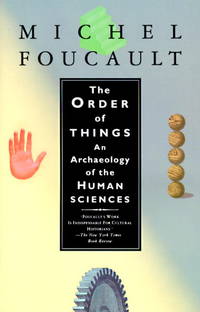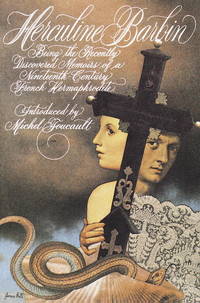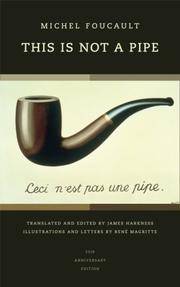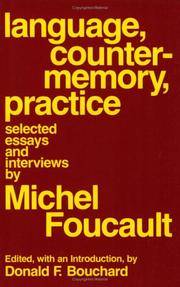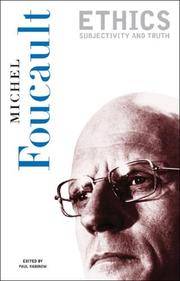Foucault is known for his critiques of various social institutions, most notably psychiatry, medicine, and the prison system, and also for his theories on
The History Of Sexuality. His general theories concerning
Power and the relation between power and knowledge, as well as his ideas concerning "discourse" in relation to the history of Western thought, have been widely discussed and applied. Foucault was also critical of social constructs that implied an identity, from the identity of male/female and homosexual to that of criminals and political activists. Foucault's theories on identity are exemplified by his observation that homosexual identity has progressed over the years from an implied act to an implied identity.
His work is often described as postmodernist or post-structuralist by contemporary commentators and critics. During the 1960s, however, he was more often associated with the structuralist movement. Although he was initially happy with this description, he later emphasised his distance from the structuralist approach, arguing that unlike the structuralists he did not adopt a formalist approach. Neither was he interested in having the postmodern label applied to his own work, saying he preferred to discuss how "modernity" was defined.
Foucault resisted biography on the grounds that he was both a constantly evolving personality and that publicly he exists through his work. Of this he wrote "Do not ask me who I am and do not ask me to remain the same."
Early life
Foucault was born in 1926 in Poitiers as Paul-Michel Foucault to a notable provincial family. His father, Paul Foucault, was an eminent surgeon and hoped his son would join him in the profession. Foucault later dropped 'Paul' from his name for reasons which are not entirely clear. His early education was a mix of success and mediocrity until he attended the Jesuit College Saint-Stanislaus where he excelled. During this period, Poitiers was part of Vichy France and later came under German occupation. After World War II, Foucault gained entry to the prestigious Ecole Normale Superieure (rue d'Ulm), the traditional gateway to an academic career in the humanities in France.
The Ecole Normale Superieure
Foucault's personal life during the Ecole Normale was difficult- he suffered from acute depression, even attempting suicide. He was taken to see a psychiatrist. Perhaps because of this, Foucault became fascinated with psychology. Thus, in addition to his licence (degree) in philosophy he also earned a licence in psychology, which was at that time a very new qualification in France, and was involved in the clinical arm of the discipline where he was exposed to thinkers such as Ludwig Binswanger.
Like many 'normaliens' , Foucault joined the French Communist Party from 1950 to 1953. He was inducted into the party by his mentor Louis Althusser. He left due to concerns about what was happening in the Soviet Union under Stalin. Unlike most party members, Foucault never actively participated in his cell.
Early career
Foucault passed his agregation in 1950. After a brief period lecturing at the Ecole Normale, he took up a position at the University of Lille, where from 1953 to 1954 he taught psychology. In 1954 Foucault published his first book, Maladie mentale et personnalite, a work which he would later disavow. It soon became apparent that Foucault was not interested in a teaching career, and he undertook a lengthy exile from France. In 1954 Foucault served France as a cultural delegate to the University of Uppsala in Sweden (a position arranged for him by Georges Dumezil, who was to become a friend and mentor). In 1958 Foucault left Uppsala for briefly held positions at Warsaw University and at the University of Hamburg.
Foucault returned to France in 1960 to complete his doctorate and take up a post in philosophy at the University of Clermont-Ferrand. There he met Daniel Defert, with whom he lived in non-monogamous partnership for the rest of his life. In 1961 he earned his doctorate by submitting two theses (as is customary in France): a "major" thesis entitled Folie et deraison:
Histoire De La Folie a L'Age Classique and a 'secondary' thesis which involved a translation and commentary on Kant's Anthropology from a Pragmatic Point of View.
Raymond Roussel, and a reissue of his 1954 volume (now entitled Maladie mentale et psychologie) which he would again disavow.
After Defert was posted to Tunisia for his military service, Foucault moved to a position at the University of Tunis in 1965. In 1966 he published The Archaeology of Knowledge)- a response to his critics- in 1969.
Post-1968: Foucault the activist
In the aftermath of 1968, the French government created a new experimental university at Vincennes. Foucault became the first head of its philosophy department in December of that year and appointed mostly young leftist academics (such as Judith Miller) whose radicalism provoked the Ministry of Education to withdraw the department's accreditation. Foucault notoriously also joined students in occupying administration buildings and fighting with police.
Foucault's tenure at Vincennes was short-lived, as in 1970 Foucault was elected to France's most prestigious academic body, the College de France as Professor of the History of Systems of Thought. His political involvement now increased, Defert having joined the ultra-Maoist Gauche Proletarienne (GP), with whom Foucault became very loosely associated. Foucault helped found the Prison Information Group (in French: Groupe d'Information sur les Prisons, or GIP) to provide a way for prisoners to voice their concerns. This fed into a marked politicization of Foucault's work, with a book, Discipline and Punish), which "narrates" the micro-power structures that developed in Western societies since the eighteenth century, with a special focus on prisons and schools.
The late Foucault
In the late 1970s political activism in France tailed off with the disillusionment of many if not most Maoists. Several of them underwent a complete reversal in ideology, becoming the so-called New Philosophers, and often cited Foucault as their major influence, a status about which Foucault had mixed feelings. Foucault in this period began a mammoth project to write a History of Sexuality, which he was never to complete. Its first volume, The
Will To Knowledge, was published in 1976, and has much in common with Discipline and Punish. The second and third volumes did not appear for another eight years, and they surprised readers by their relatively traditional style, subject matter (classical Greek and Latin texts) and approach, particularly Foucault's concentration on the subject, a concept he had previously tended to denigrate.
Foucault began to spend more time in the United States, at University at Buffalo (where he had lectured on his first ever visit to the United States in 1970) and especially at UC Berkeley. In 1975 he took LSD at Zabriskie Point in Death Valley National Park, later calling it the best experience of his life. In 1978 Foucault made two tours of Iran, undertaking extensive interviews with political protagonists in support of the new revolutionary Islamic government there. His many essays on Iran were published in the Italian newspaper Corriere Della Sera, but remained little known to Foucault's admirers in the English and French-speaking nations until they were published in English in 2005. These essays caused some controversy, with some commentators arguing that Foucault was insufficiently critical of the new regime.
Foucault enthusiastically participated in the gay culture in San Francisco, particularly in the S&M culture- it is suspected that it was here that he contracted HIV, in the days before the disease was described as such. Foucault died of an AIDS-related illness in Paris June 26th, 1984.
Works
Madness and Civilization
For more details on this topic, see Madness and Civilization.
The English edition of Madness and Civilization is an abridged version of Folie et deraison: Histoire de la folie a l'age classique, originally published in 1961. (A full translation titled The
History Of Madness is due to be published by Routledge on March 31, 2006: ISBN 0415277019) This was Foucault's first major book, written while he was the Director of the Maison de France in Sweden. It examines ideas, practices, institutions, art and literature relating to madness in Western history.
Foucault begins his history in the Middle Ages, noting the social and physical exclusion of lepers. He argues that with the gradual disappearance of leprosy, madness came to occupy this excluded position. The ship of fools in the 15th century is a literary version of one such exclusionary practice, the practice of sending mad people away in ships. In 17th century Europe, in a movement which Foucault famously describes as the Great Confinement, "unreasonable" members of the population were locked away and institutionalised. In the eighteenth century, madness came to be seen as the obverse of Reason, and, finally, in the nineteenth century as mental illness.
Foucault also argues that madness lost its power to signify the limits of social order and to point to the truth and was silenced by Reason. He examines the rise of scientific and "humanitarian" treatments of the insane, notably at the hands of Philippe Pinel and Samuel Tuke. He claims that these new treatments were in fact no less controlling than previous methods. Tuke's country retreat for the mad consisted of punishing the madmen until they learned to act "reasonably". Similarly, Pinel's treatment of the mad amounted to an extended aversion therapy, including such treatments as freezing showers and use of a straitjacket. In Foucault's view, this treatment amounted to repeated brutality until the pattern of judgment and punishment was internalized by the patient.
The Birth Of the Clinic
Foucault's second major book, Naissance de la clinique: une archeologie du regard medical in French) was published in 1963 in France, and translated to English in 1973. Picking up from Madness and Civilization, The Birth of the Clinic traces the development of the medical profession, and specifically the institution of the clinique (translated as "clinic", but here largely referring to teaching hospitals). Its motif is the concept of the medical regard (a concept which has garnered a lot of attention from English-language readers, due to Alan Sheridan's unusual translation, "medical gaze").
The Order Of Things
Foucault's The Order of Things: An Archaeology of the Human Sciences. (Foucault had preferred L'Ordre des Choses for the original French title, but changed the title to suit the wishes of his editor, Pierre Nora.)
The book opened with an extended discussion of Diego Velazquez's painting Las Meninas and its complex arrangement of sight-lines, hiddenness and appearance. Then it developed its central claim: that all periods of history possessed certain underlying conditions of truth that constituted what was acceptable as, for example, scientific discourse. Foucault argued that these conditions of discourse changed over time, in major and relatively sudden shifts, from one period's episteme to another.
The Order of Things brought Foucault to prominence as an intellectual figure in France. A review by Jean-Paul Sartre attacked Foucault as 'the last rampart of the bourgeoisie'.
The
Archaeology Of Knowledge
Published in 1969, this volume was Foucault's main excursion into methodology. He wrote it in order to deal with the reception that
Les Mots Et Les Choses had received. It makes references to Anglo-American analytical philosophy, particularly speech act theory.
Foucault directs his analysis toward the "statement", the basic unit of discourse that he believes has been ignored up to this point. "Statement" is the English translation from French enonce (that which is enounced or expressed), which has a peculiar meaning for Foucault. "Enonce" for Foucault means that which makes propositions, utterances, or speech acts meaningful. In this understanding, statements themselves are not propositions, utterances, or speech acts. Rather, statements create a network of rules establishing what is meaningful, and it is these rules that are the preconditions for propositions, utterances, or speech acts to have meaning. Depending on whether or not they comply with the rules of meaning, a grammatically correct sentence may still lack meaning and inversely, an incorrect sentence may still be meaningful. Statements depend on the conditions in which they emerge and exist within a field of discourse. It is huge entities of statements, called discursive formations, toward which Foucault aims his analysis. It is important to note that Foucault reiterates that the analysis he is outlining is only one possible tactic, and that he is not seeking to displace other ways of analysing discourse or render them as invalid.
Foucault's posture toward the statements is radical. Not only does he bracket out issues of truth; he also brackets out issues of meaning. Rather than looking for a deeper meaning underneath discourse or looking for the source of meaning in some transcendental subject, Foucault analyzes the conditions of existence for meaning. In order to show the principles of meaning production in various discursive formations he details how truth claims emerge during various epochs on the basis of what was actually said and written during these periods of time. He particularly describes the Renaissance, the Age of Enlightenment, and the 20th Century. He strives to avoid all interpretation and to depart from the goals of hermeneutics. This posture allows Foucault to move away from an anthropological standpoint and focus on the role of discursive practices.
Dispensing with finding a deeper meaning behind discourse would appear to lead Foucault toward structuralism. However, whereas structuralists search for homogenity in a discursive entity, Foucault focuses on differences. Instead of asking what constitutes the specificity of European thought he asks what differences develop within it over time. Therefore, he refuses to examine statements outside of their role in the discursive formation, and he never examines possible statements that could have emerged from such a formation. His identity as a historian emerges here, as he is only interested in analysing actual statements in history. The whole of the system and its discursive rules determine the identity of the statement. But, a discursive formation continually generates new statements, and some of these usher in changes in the discursive formation that may or may not be realized. Therefore, to describe a discursive formation, Foucault also focuses on expelled and forgotten discourses that never happen to change the discursive formation. Their difference to the dominant discourse also describe it. In this way one can describe specific systems that determine which types of statements emerge.
Discipline and Punish
Surveiller et punir: Naissance de la prison, published in 1975.
The book opens with a graphic description of the brutal public execution in 1757 of Robert-Francois Damiens, who attempted to kill Louis XV. Against this it juxtaposes a colourless prison timetable from just over 80 years later. Foucault then inquires how such a change in French society's punishment of convicts could have developed in such a short time. These are snapshots of two contrasting types of Foucault's "Technologies of Punishment". The first type, "Monarchical Punishment", involves the repression of the populace through brutal public displays of executions and torture. The second, "Disciplinary Punishment," is what Foucault says is practiced in the modern era. Disciplinary punishment gives "professionals" (psychologists, programme facilitators, parole officers, etc.) power over the prisoner, most notably in that the prisoner's length of stay depends on the professionals' opinion.
Foucault also compares modern society with Jeremy Bentham's "Panopticon" design for prisons (which was unrealized in its original form, but nonetheless influential): in the Panopticon, a single guard can watch over many prisoners while the guard remains unseen. The dark dungeon of pre-modernity has been replaced with the bright modern prison, but Foucault cautions that "visibility is a trap". It is through this visibility, Foucault writes, that modern society exercises its controlling systems of power and knowledge (terms which Foucault believed to be so fundamentally connected that he often combined them in a single hyphenated concept, "power-knowledge"). Foucault suggests that a "carceral continuum" runs through modern society, from the maximum security prison, through secure accommodation, probation, social workers, police, and teachers, to our everyday working and domestic lives. All are connected by the (witting or unwitting) supervision (surveillance, application of norms of acceptable behaviour) of some humans by others.
The History of Sexuality
Three volumes of
Histoire De La Sexualite, 1:
La Volonte De Savoir in French) was published in France in 1976, and translated in 1977, focusing primarily on the last two centuries, and the functioning of sexuality as an analytics of power related to the emergence of a science of sexuality (scientia sexualis) and the emergence of biopower in the West. In this volume he attacks the "repressive hypothesis," the very widespread belief that we have, particularly since the nineteenth century, "repressed" our natural sexual drives. He shows that what we think of as "repression" of sexuality actually constituted sexuality as a core feature of our identities, and produced a proliferation of discourse on the subject.
The second two volumes, Histoire de la sexualite, III: le souci de soi) dealt with the role of sex in Greek and Roman antiquity. Both were published in 1984, the year of Foucault's death, with the second volume being translated in 1985, and the third in 1986. Some believe that a fourth volume, dealing with the Christian era, was almost complete at the time of Foucault's death. Foucault scholar and friend, Arnold Davidson, has denied that an intended fourth and fifth volume in the series had ever been written.
Lectures
From 1970 until his death in 1984, from January to March of each year except 1977, Foucault gave a course of public lectures and seminars weekly at the College de France as the condition of his tenure as professor there. All these lectures were tape-recorded, and Foucault's transcripts also survive. In 1997 these lectures began to be published in French with six volumes having appeared so far. So far, three sets of lectures have appeared in English:
Fearless Speech.
Society Must Be Defended (1976-77)
In this course, Michel Foucault analyzed the historical and political discourse of "race struggle". He also conceptualized "state racism", which would lead him to the 1978-79 course on
The Birth Of Biopolitics.
Terminology
Terms coined or largely redefined by Foucault, as translated into English:
* biopower/biopolitics
* Disciplinary institutions
* episteme
* genealogy
* governmentality
* heterotopia
* parrhesia
* power
* state racism
Many thinkers have criticized Foucault, ranging from Charles Taylor, Noam Chomsky, Camille Paglia, Jurgen Habermas, Jacques Derrida, and Nancy Fraser to Slavoj Zizek and historian Hayden White, among others. An entire book has been written as a critical evaluation of Foucault's achievements. While each of them takes issue with different aspects of Foucault's work, all of these approaches share the same basic orientation: Foucault clearly seems to reject the liberal values and philosophy associated with the Enlightenment while simultaneously secretly relying on them. They argue that this failure either makes him dangerously nihilistic, or that he cannot be taken seriously in his disavowal of normative values while in fact his work ultimately presupposes them.
Some historians as well as others have also criticised Foucault for his use of historical information, claiming that he frequently misrepresented things, got his facts wrong, or simply made them up entirely. Perhaps the most notable of these was Jacques Derrida's extensive critique of Foucault's reading of Rene Descartes' Meditations on First Philosophy. Derrida's criticism led to a break in their friendship and marked the beginning of a fifteen year-long feud between the two.
It is important to note, however, that there has been considerable debate over both these sets of criticisms and they are not universally accepted as valid by all critics. Foucault himself on a number of occasions took issue with the first kind of criticism noting that he believed strongly in human freedom and that his philosophy was a fundamentally optimistic one, as he believed that something positive could always be done no matter how bleak the situation. One might also add that his work is actually aimed at refuting the position that Reason (or "rationality") is the sole means of guaranteeing truth and the validity of ethical systems. Thus, to criticise Reason is not to reject all notions of truth and
Ethics as some of these critics claim.
There are notable exchanges with Lawrence Stone and George Steiner on the subject of Foucault's historical accuracy as well as a discussion with historian Jacques Leonard concerning Discipline and Punish. Foucault's "histories" have nonetheless drawn considerable attention from "mainstream" historians as Foucault's works frequently dealt with unique or overlooked historical problems.
Foucault's changing viewpoint
The study of Foucault's thought is complicated because his ideas developed and changed over time. His ideas are best understood as different (but related) bodies of thought associated with each of his different major publications. Thus the Foucault who wrote Madness and Civilisation (1961) did not have quite the same set of ideas as the Foucault who wrote The Archaeology of Knowledge (1969); and the Foucault who wrote The History of Sexuality (1976-84) had developed an altogether new approach. As David Gauntlett (2002) explains:
"Of course, there's nothing wrong with Foucault changing his approach; in a 1982 interview, he remarked that 'When people say, "Well, you thought this a few years ago and now you say something else," my answer is… [laughs] "Well, do you think I have worked [hard] all those years to say the same thing and not to be changed?"' (2000: 131). This attitude to his own work fits well with his theoretical approach- that knowledge should transform the self. When asked in another 1982 interview if he was a philosopher, historian, structuralist, or Marxist, Foucault replied 'I don't feel that it is necessary to know exactly what I am. The main interest in life and work is to become someone else that you were not in the beginning' (Martin, 1988: 9)."
(from David Gauntlett, 2002, Media, Gender and Identity, London: Routledge).
In a similar vein, Foucault preferred not to claim that he was presenting a coherent and timeless block of knowledge; rather, he said:
"I would like my books to be a kind of tool-box which others can rummage through to find a tool which they can use however they wish in their own area... I would like the little volume that I want to write on disciplinary systems to be useful to an educator, a warden, a magistrate, a conscientious objector. I don't write for an audience, I write for users, not readers."
(Michel Foucault, (1974)






